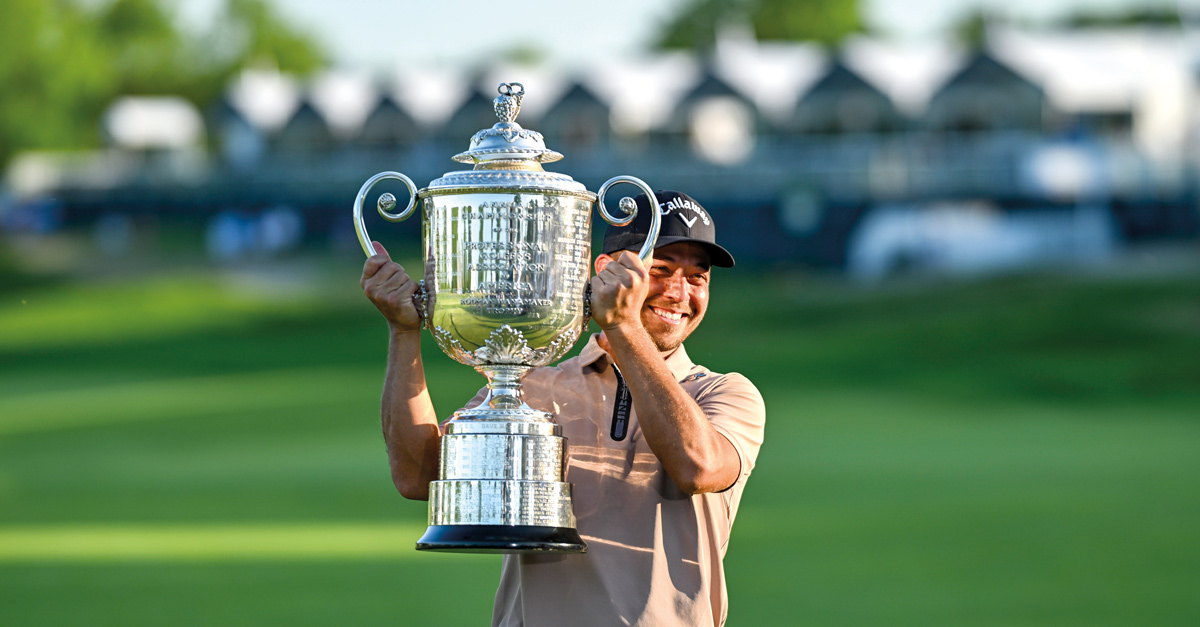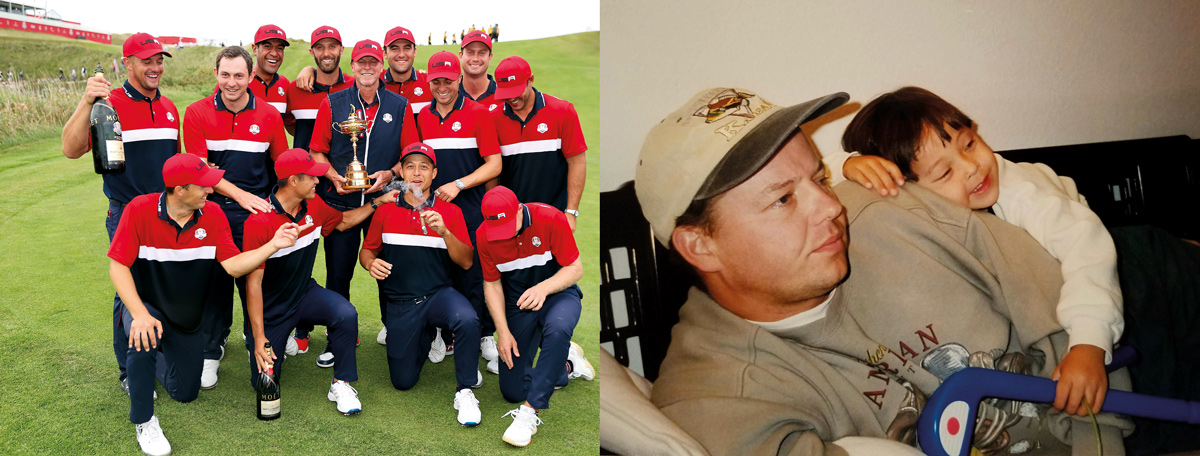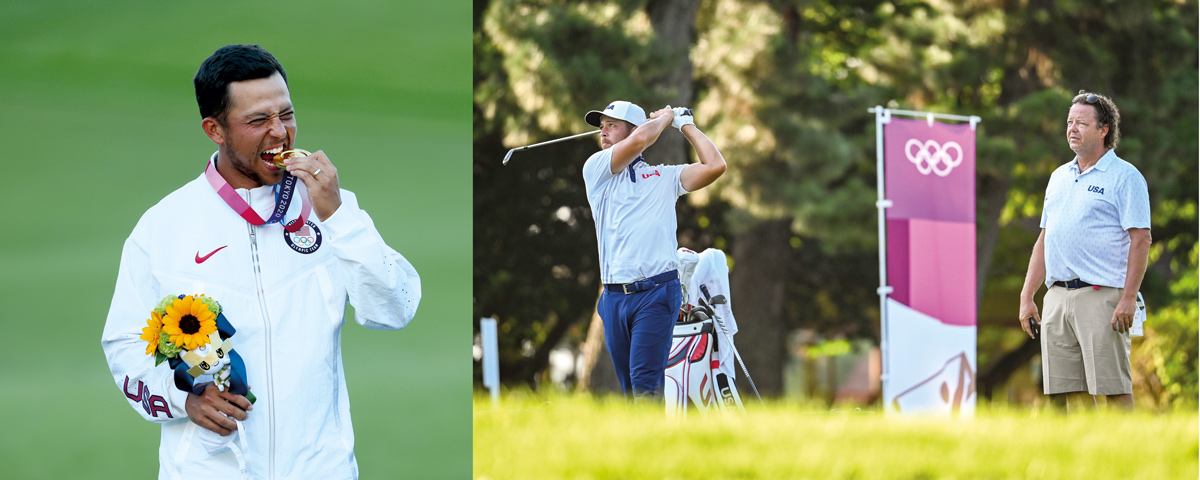
ander Schauffele made his debut in the Junior World Golf Championships as a 9-year-old, in 2003, at Reidy Creek near San Diego. His nerves were jangled when the pro shop did not have a yardage book for the par-3 course, where the 9-to-10-year-olds competed. Schauffele’s father, Stefan, took matters into his own hands.
“My dad created a yardage book for me,” remembers Schauffele, in an exclusive interview with Kingdom magazine, a couple days after he had become a major champion at the 2024 PGA Championship at Valhalla Golf Club in Louisville, Kentucky.
“He just wanted me to be as professional as possible and to motivate me as much as he could, because he knew I was really nervous,” Schauffele adds. “He traced some holes on the pages, and on each page of the yardage book he wrote little phrases.”
Some of the phrases were technical reminders—as Stefan was Dad and coach—some were motivational, while others were little jokes to lighten the tension.
Xander did not win that week, but it began a habit of competing at the highest level available to him, which would lead to success on the PGA Tour, at the Ryder Cup, at the Olympics, and now, at the PGA Championship.
At Valhalla, the 30-year-old Californian opened with a scorching 62, nine under par, to set a PGA Championship scoring record and take the first-round lead. Schauffele then went wire-to-wire—such an incredibly hard feat in a major—closing with a birdie on the final hole of a dramatic tournament to edge Bryson DeChambeau by a shot.

Schauffele’s four-day total came to 263, or 21 under par, both marks setting new men’s major scoring records. Yet it was close, with all of Collin Morikawa, DeChambeau, and Norway’s Viktor Hovland climbing into a tie with Schauffele for the lead at different points on the final day.
More than 20 years on from that drawn yardage book, the phrases from Stefan Schauffele remain instrumental to his son. On May 19 at Valhalla, as Xander tried to grasp the enormity of what he had just achieved, he referred to a phrase from that yardage book that helped him cope with leading a major for four days: “Commit, Execute, Accept,” or “C.E.A.” for short.
“When you are in a tough spot, you can over-complicate things and your brain goes way too fast,” he says. “One of the most important things was to commit, execute, and accept. It is such a simple thought, and to simplify the moment was really important for me.”

Stefan Schauffele is not very easy to contact. The Schauffele family purchased a remote, 22-acre plot on the Hawaiian island of Kauai, and Stefan heads out there for weeks on end, living in a container on a hillside, without running water, to prepare the land for construction of a farmhouse and working farm. He is often out of range for wifi or a cell phone—and that’s how he likes it. So we are delighted to get a call through to the elder Schauffele soon after the PGA Championship, the conclusion to which he watched on a friend’s TV.
“Schauffele in German means ‘Man with a shovel’,” says the German-born Stefan, 59, on a surprisingly clear phone line. “I grew up laying bricks in the summer while others went on vacation, and I know how to frame a house. I am a general contractor, so I am very hands-on. I am running excavators, bulldozers, and tractors. When building begins, I will lay bricks. I will literally have my own hands in the mud, to ensure I have everything the way I want it.”
Stefan has handed his son’s coaching reins to Chris Como, but he remembers the yardage book from Reidy Creek. “My wife has the book somewhere at home in San Diego,” he says. “I came up with a bunch of key words or phrases that would stick in a young boy’s mind.”
Another key phrase: “Rhythm equals balance equals power.”
“Power starts with rhythm,” explains Stefan, “and you can’t be powerful without balance. For Xander, power is the result of rhythm and balance.”

“Some of the phrases come from German philosophy,” says Xander. “Another one is: ‘A steady drip caves the stone.’ That is one of Dad’s big ones. He just wanted me to be on this calm, steady incline for my entire career, with nothing too fancy or too crazy, but just to stay the course, and then good things happen. That is what I am trying to do.”
Stefan was an exceptional athlete in his own right. At the age of 20, in 1985, he was selected to join the prestigious “Aufbaukader”—development squad—for the German national decathlon team. However, just months after he started training with the squad, Stefan’s car was struck head-on by a drunk driver, leaving him with serious injuries and blind in one eye. With one terrible stroke of misfortune, his dream of competing in the Olympics
was stolen.
“I never even competed in a full decathlon,” reflects Stefan, whose grandfather, Richard Schauffele, showed similar ability in the early 1900s, without reaching the Olympic stage. “I showed promise, and there was hope. People would tell me how good I was, but I never got the chance to prove it. In hospital, I promised myself that if I ever have children, they would absolutely reach the limitation of their abilities. That explains my motivation. I promised Xander that he would find out how good he is, because that is the one thing I was deprived of.”
I promised Xander that he would find out how good he is.” — Stefan Schauffele
It was particularly poignant, 36 years later, when Stefan’s second son, Xander, represented the United States in the Tokyo Olympics. “My dad’s whole life was dedicated to trying to compete in the Olympics,” Xander says. “Lots of the stuff he taught me growing up—like trying to be good at every part of my game—it has the decathlete’s approach to it.”
The Tokyo Games were the Covid games, postponed by a year to 2021. Schauffele could take two people with him, so he took his caddie, Austin Kaiser, and his father. Similarly to this year’s PGA Championship, he had to hold his nerve down a tense final stretch at Kasumigaseki Country Club, as Rory Sabbatini—representing Slovakia—made a spirited late charge. Schauffele prevailed by a single shot to bring home gold.
“The Olympics are so special to me because of my dad,” Xander says. “I know that the Olympic gold medal is pretty much the coolest thing I could deliver as a son to a father. It was almost like a Schauffele curse that no one was able to cross the finish line. For me to achieve it for my family is something no one can ever take away from us.”
It is 8 am on a Thursday morning in Hawaii when Stefan speaks to Kingdom, with a full day’s groundwork ahead. But as we discuss the moment that his son won gold, the emotion rises fast.
“Xander just… [pause], I don’t know,” says Stefan. “Well, he said to me that he went out and won the gold medal for me.”
Words that mean so much can be the hardest to speak.
“During play I am an observer and not a spectator,” continues Stefan, quickly recovering, “because I am so involved, and I look at statistics, and I work out percentages, and I am very analytical, and so during play it is not emotional. On the final hole in Tokyo, they had TV cameras in my face, trying to catch me crying—you know, that’s television—but I was not emotional then. The game is not over until it’s over, and I was rather stoic, but my God, once…. [pause]—you see, I have to take a breath—once Xander stood on the podium, the floodgates opened. At that moment, I melted. For me [pause]… it can’t be topped. It was wonderful.”
Qualifying for the U.S. Olympic men’s golf team is one of the hardest tasks in sports. Only four men can go, based on the World Ranking, and at the time of writing, six of the world’s top 10 were American. (Schauffele’s victory at Valhalla pushed him to a career-high second place in the ranking, though he slipped to No. 3 after the U.S. Open.) Schauffele has deservedly earned a return trip to the Games, where he will represent the U.S. alongside World No. 1 Scottie Scheffler, Wyndham Clark, and Collin Morikawa.
The Paris Olympics will be another nerve-racking test for Schauffele. And yet, his ability to simplify the moment—and, perhaps, to think back to a few of Dad’s yardage book notes—should help him focus if he works his way into contention again.
Follow Us On


| Cookie | Duration | Description |
|---|---|---|
| cookielawinfo-checkbox-analytics | 11 months | This cookie is set by GDPR Cookie Consent plugin. The cookie is used to store the user consent for the cookies in the category "Analytics". |
| cookielawinfo-checkbox-functional | 11 months | The cookie is set by GDPR cookie consent to record the user consent for the cookies in the category "Functional". |
| cookielawinfo-checkbox-necessary | 11 months | This cookie is set by GDPR Cookie Consent plugin. The cookies is used to store the user consent for the cookies in the category "Necessary". |
| cookielawinfo-checkbox-others | 11 months | This cookie is set by GDPR Cookie Consent plugin. The cookie is used to store the user consent for the cookies in the category "Other. |
| cookielawinfo-checkbox-performance | 11 months | This cookie is set by GDPR Cookie Consent plugin. The cookie is used to store the user consent for the cookies in the category "Performance". |
| viewed_cookie_policy | 11 months | The cookie is set by the GDPR Cookie Consent plugin and is used to store whether or not user has consented to the use of cookies. It does not store any personal data. |